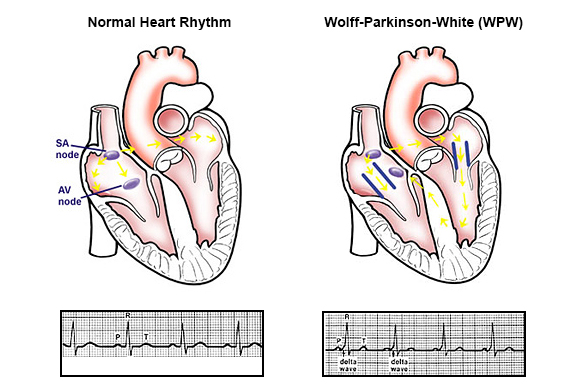Heart & Cardiovascular
Wolff-Parkinson-White (WPW) syndrome
By D.A. (staff writer) , published on November 01, 2020

Medicine Telehealth Health wolff parkinson syndrome WPW syndrome
Wolff-Parkinson-White syndrome
Wolff-Parkinson-White (WPW) syndrome is a relatively common heart condition that causes the heart to beat abnormally fast for periods of time.
The cause is an extra electrical connection in the heart. This problem with the heart is present at birth (congenital), although symptoms may not develop until later in life. Many cases are diagnosed in otherwise healthy young adults.
Sometimes the extra electrical connection won't cause any symptoms and may only be picked up when an electrocardiogram (ECG) test is carried out for another reason. In these cases, further tests will be done to determine if treatment is required.
Is it serious?
It can be scary to be told that you have a problem with your heart, but WPW syndrome usually isn't serious.
Many people will have no symptoms or only experience occasional, mild episodes of their heart racing. With treatment, the condition can normally be completely cured.
WPW syndrome can sometimes be life-threatening, particularly if it occurs alongside a type of irregular heartbeat called atrial fibrillation. But this is rare and treatment can eliminate this risk.
What causes WPW syndrome?
When the heart beats, its muscular walls contract (tighten and squeeze) to force blood out and around the body. They then relax, allowing the heart to fill with blood again. This is controlled by electrical signals.
In WPW syndrome, there's an extra electrical connection in the heart, which allows electrical signals to bypass the usual route and form a short circuit. This means the signals travel round and round in a loop, causing episodes where the heart beats very fast.
The extra electrical connection is caused by a strand of heart muscle that grows while the unborn baby is developing in the womb.
It's not clear exactly why this happens. It just seems to occur randomly in some babies, although rare cases have been found to run in families.
Normally, electrical signals follow a certain pathway through the heart. This helps the heart beat regularly. This prevents the heart from having extra beats or beats happening too soon.
In people with WPW syndrome, some of the heart's electrical signals go down an extra pathway. This may cause a very rapid heart rate called supraventricular tachycardia.
Most people with WPW syndrome do not have any other heart problems. However, this condition has been linked with other cardiac conditions. A form of the condition also runs in families.
Diagnosis
A diagnosis of WPW syndrome is suspected based upon a thorough clinical evaluation, a detailed patient history and a variety of specialized tests. Such tests might include an electrocardiogram (ECG), Holter monitor, and electrophysiology study. An electrocardiogram records the heart's electrical impulses and may reveal abnormal electrical patterns.
A Holter monitor is a portable device designed to continuously monitor the electrical activity of the heart. A Holter monitor is usually worn for 24 hours.
During electrophysiology study, a thin tube (catheter) is inserted into a blood vessel and threaded to the heart where it measures electrical activity. Each of these specialized tests can detect abnormal heart rhythms associated with WPW syndrome.
Some individuals with WPW syndrome may be clinically "silent" meaning that they have no symptoms associated with the disorder including no abnormal findings on various heart tests.
References
Wolff-Parkinson-White (WPW) syndrome - Symptoms and causes. Mayo Clinic. Accessed October 27, 2020. https://www.mayoclinic.org/diseases-conditions/wolff-parkinson-white-syndrome/symptoms-causes/syc-20354626
Wolff-Parkinson-White syndrome. nhs.uk. Published October 18, 2017. Accessed October 27, 2020. https://www.nhs.uk/conditions/wolff-parkinson-white-syndrome/
Wolff-Parkinson-White syndrome (WPW): MedlinePlus Medical Encyclopedia. Accessed October 27, 2020. https://medlineplus.gov/ency/article/000151.htm
Find articles related to: Medicine Telehealth Health wolff parkinson syndrome WPW syndrome
More articles about Heart & Cardiovascular
Back to the Health Tips Index




